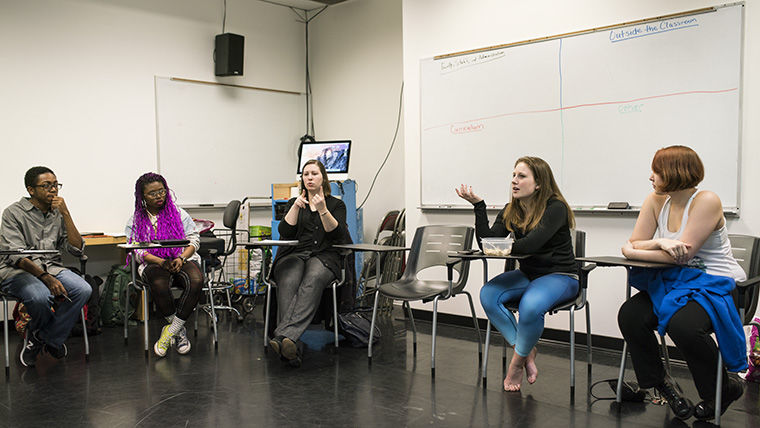Few students express concerns at DEI town hall meeting
February 13, 2017

Students voiced personal experiences they have had with different college programs to the Diversity, Equity & Inclusion Student Advisory Board during a Feb. 8 town hall meeting.
Junior American Sign language-English interpretation major Cory O’Brien claimed to have waited five hours before receiving attention at the Health Center because he hadn’t made an appointment—one of several complaints made at the first Diversity, Equity & Inclusion Student Board Advisory Town Hall meeting Feb. 8. Though the board reached out to students through posters and emails, only seven students attended the event.
The meeting, held at the Dance Center in the 1306 S. Michigan Ave. Building, gave students the opportunity to share feedback on their college experience.
O’Brien voiced concerns about the value of student services at the college when compared to other institutions.
“While they exist, are free and are technically accessible, the quality of the services, considering the tuition that we pay, [is less than that of the School of the Art Institute of Chicago],” O’Brien, a former SAIC student, said.
The meeting, hosted by the DEI Student Advisory Board—a group created to communicate information from students to the larger DEI Committee formed of faculty and staff—invited students to fill out surveys and express concerns to the board members. The surveys asked about diversity on campus and in classrooms and programs such as Student Financial Services, the Advising Center and the Health Center.
The surveys and experiences of students who attended the meetings will be compiled into a report at the end of the semester and presented to the DEI Committee, according to Kaela Ritter, senior business & entrepreneurship major, Student Government President and DEI Student Advisory Board member.
During the meeting, students relayed negative experiences with the college, such as receiving information via email that conflicted with what a student’s dean had told her in person.
Students also complained about insufficient assistance from advisers, collaboration between departments, awareness among students about student spaces and services like the Counseling Center and a lack of diversity among teachers.
Elizabeth Rangel, a Hispanic junior American sign language-English interpretation major, said one of the first times she encountered other Hispanic students was when she took a Latin-American history course, which a Caucasian woman taught.
Rangel said she thought the conversations held at the meeting were beneficial but felt an open forum should have already existed.
“This is probably one of the first meetings I have ever been to in which you have students who are open to discussing the diversity, equity and inclusion they feel, and you find that these experiences are not just your own; they are other people’s too, whatever ethnicity they are,” Rangel said.
Besides the board’s faculty adviser, David Keys, no faculty, administration or staff are allowed to attend the forums so students can speak openly in a safe space, said Malik Woolfork, junior business & entrepreneurship major and advisory board member.
Woolfork said the first town hall was small but was a good start because it allowed the student advisory board to tailor the meetings to student needs.
The student board members will be meeting every other week to review the information from the meeting and discuss the content of the final report, according to Woolfork.
Five other Student Advisory Board town hall meetings are scheduled in different locations throughout the campus during the Spring semester, so students around campus will get the opportunity to share their thoughts, according to Ritter.
“The school is run by students,” Ritter said. “Our administration [and] our faculty and staff wouldn’t be here if we weren’t here. I would hope they take everything we say into consideration and that it will provide them more of a direction as to where the target areas would be across campus.”







